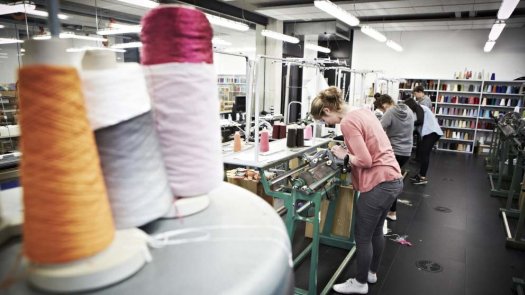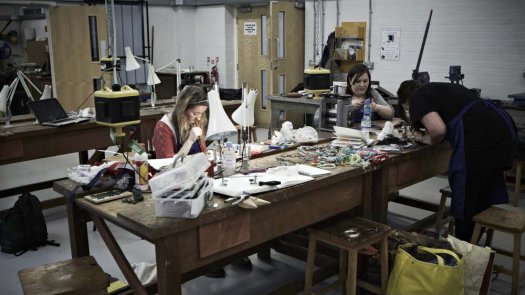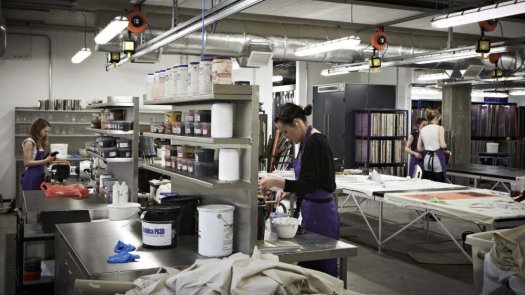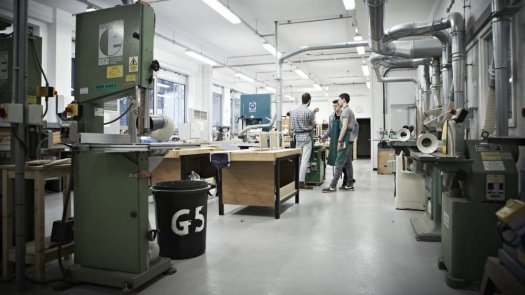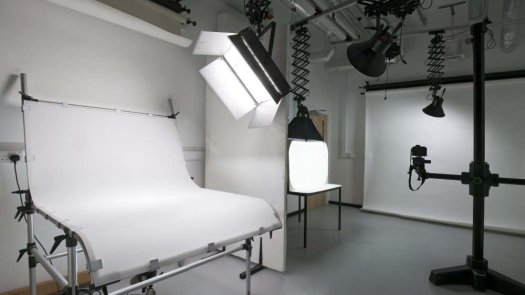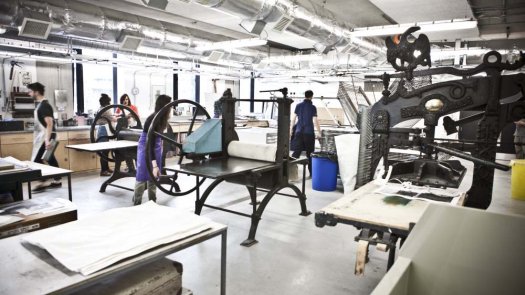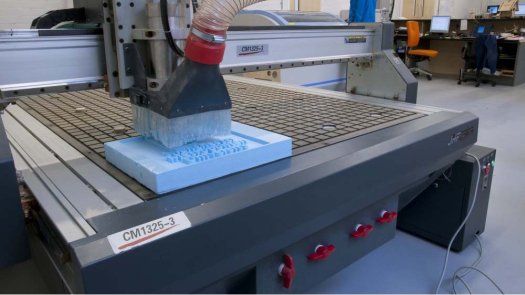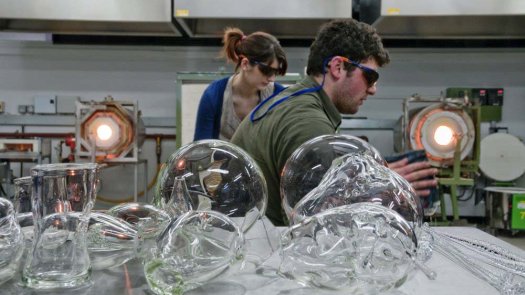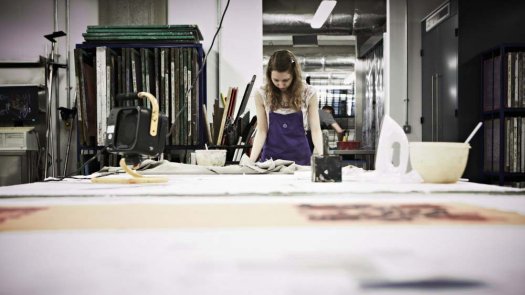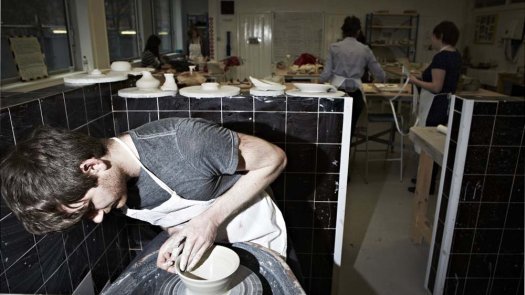Product Design
Product Design
MSc – 1 year (full-time) or 2 years (part-time)
This course is at the forefront of contemporary product design practices and brings together students from creative and technical backgrounds, to foster original approaches to the application of product design and design innovation. It supports you to explore and develop personal design methodologies and philosophies, and locate these within a deep understanding of historical, contemporary and future design practices, and wider social and cultural contexts.
You will undertake core modules, delivered by product design specialists, consisting of design theory and practice lectures, group seminars, individual tutorials, live external projects, and research study trips. Practical design development is supported by extensive hand and machine workshops for wood, metal, ceramics, glass and plastics, and digital workshops for laser cutting and large-scale CNC routing.
Optionality within modules facilitates innovative cross-disciplinary opportunities, supporting the development of collaborative working with students from across the wider postgraduate design community.
You will be able to explore and challenge all aspects of product design, embracing opportunities for innovation across markets and production levels, from one-off making and batch fabrication, to flexible digital manufacture and high-volume industrial production.
Your programme of study is managed through personal tutorials, developed in response to your individual creative and professional ambitions. The final Synthesis unit determines the postgraduate award, with the MSc reflecting work that has a more technically and functionally innovative focus, and the MA for work that addresses more materially creative or culturally focussed agendas.
Features
- —While studying towards a particular qualification at MA/MSc level, students experience their subject in the broader context of contemporary design practice.
- —Dedicated spaces have been developed to enable the postgraduate community to flourish. These spaces, for thinking and practice, are based in the heart of Manchester School of Art, allowing easy access to an extensive range of workshops where the combination of traditional and state of the art equipment opens up a world of exciting possibilities.
- —You will be taught by research active staff who are experts in their field.
- —The University library has outstanding Art and Design holdings, including a special collection of artist's books and ephemera.
Ye Yuan, a Product Design graduate who tells stories through is creations, discusses his time at Manchester School of Art, his move to Manchester and how the city’s inspired him.
Course Content
Year 1 (MA Full-Time)
The MA/MSc in Product Design is composed of five units, totalling 180 credits.
Art & Design: Culture & Context (MA:X)
This module offers focussed opportunity for students to extend and enhance their practice by including working in a wider design research community. The study of the cultural and critical contexts of design practice is vital to any student of the creative disciplines, this module will develop Master’s students’ abilities to contextualise their practice through a series of themes addressing contemporary issue in design.
Design Thinking
This module introduces an applied understanding of how design can be used as an iterative process for creative problem solving. It will enable you to understand how to apply design thinking processes to your specialist area through understanding users, challenging assumptions, redefining problems and creating innovative solutions to prototype and test. The module will also provide a broad introduction to research methodologies, strategic research planning and research design. A range of design thinking tools will be introduced and explored before you undertake an in-depth project that provides opportunities for experimentation leading to innovative solutions.
Design Futures
This module provides an in-depth understanding of the scope, nature and role of how design can be used to shape the future. A series of future-focussed tools will be explored from a creative perspective to understand how to employ design as a catalyst for new products, services and experiences that address contemporary societal and business-related challenges. It also will examine the role of design at strategic, tactical and operational levels and support an understanding of the relationship of the user to strategic goals over a range of time horizons. The module will culminate in design provocations that demonstrate how design can engage with multiple futures that blend technology and business needs while providing user-focussed innovative solutions.
Design Innovation
This module introduces the core principles of design innovation and develops a broad understanding of how design can be used as a strategic resource to drive innovation. It will explore a range of design processes and expose their application in different project settings. An interrogation of the spectrum of design innovation approaches will enable students to develop knowledge and skills in their use in academic and professional contexts. It will also develop knowledge of how design strategy and management can be used as a strategic resource in the public and private sectors and as a result enable the student to be able to critically analyse the role of design in potential political, economic, socio-cultural and technological futures.
Synthesis Project: Product Design (MA)
The final synthesis MA module will support you to develop, resolve and present a significant body of work, located within a defined area of product design practice. The module accommodates opportunities for external collaborative, industry based or international learning experiences, and enables you to undertake and submit work developed within professional placements and/or live projects.
The module synthesises the specialist product design practice you have developed throughout the programme. It also accommodates the opportunity to present your work in progress and to engage in interdisciplinary critiques to test ideas, gain feedback and support the development of your final body of work.
The content of your practice is negotiated with specialist product design staff and you will manage your learning via the development of a Synthesis project proposal. The module features a flexible assessment submission process which combines written and practical elements, the weighting of which being responsive and appropriate to your individual future ambitions, be they professionally or academically focussed.
Synthesis Project: Product Design (MSc)
This final MSc module will support you to develop and resolve a significant body of specialist product design practice. Your learning journey will be synthesised by the presentation of an innovatively ambitious project, located within a defined area of technical, market orientated or advanced digital product design.
The module accommodates opportunities for external collaborative, industry based or international learning experiences and enables you to undertake and submit work developed within professional placements and/or live projects. The module features a presentation of your work in progress to test ideas, gain feedback and to engage in interdisciplinary critique to support the development of your final body of work.
The content of your practice is negotiated with specialist product design staff and you will manage your learning via the development of a Synthesis project proposal. The module features a flexible assessment submission process which combines written and practical elements, the weighting of which being responsive and appropriate to your individual future ambitions, be they professionally or academically focussed.
Resources
We have developed a dedicated postgraduate area occupying an entire floor of the main School of Art building, offering an exciting space to be, both intellectually and practically. The centre is located in the Chatham Tower with studios, design laboratories, seminar rooms and extensive workshops that form the nucleus of this vibrant, cross-disciplinary learning environment.
Find out more about Manchester School of Art's facilities.
Student Work
Visit our online MA Show galleries to see examples of recent work by our postgraduate students.
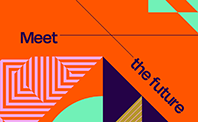

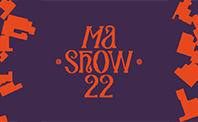
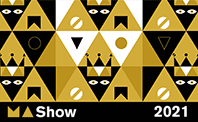
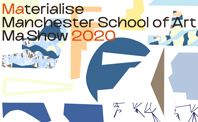

Graduates
Graduates will develop skills suitable for employment in design, and design management roles, in manufacturing and consultancy. Skills in research and contemporary design philosophies also lead to opportunities for roles in academic research and teaching.
The programme also prepares graduates for self-employment routes – developing business knowledge in support of the challenges inherent in establishing and running your own product design and manufacturing business.
Making an Application
Entry Requirements
You will normally have a minimum 2:2 UK undergraduate honours degree (or equivalent) in a related subject and must submit a portfolio. We may request an interview as part of the application process, which can be in person or online.
Overseas applicants will require IELTS with an overall score of 6.5 and no less than 5.5 in any category, or an equivalent accepted English qualification.
How to Apply
Please apply online using the link below.
Fees 2025 Entry
UK and Channel Island students
Full-time fee: £12,000 per year. Tuition fees will remain the same for each year of your course providing you complete it in the normal timeframe (no repeat years or breaks in study).
Part-time fee: £2000 per 30 credits studied. The fee per credit will remain the same for each year of your course providing you complete it in the normal timeframe (eg no repeat years or breaks in study). The total amount you pay each year may differ based on the number of credits studied.
Find out about the extra support we may be able to provide with our scholarships for UK students.
EU and non-EU international students
Full-time fee: £22,000 per year. Tuition fees will remain the same for each year of your course providing you complete it in the normal timeframe (no repeat years or breaks in study).
Part-time fee: £3667 per 30 credits studied. The fee per credit will remain the same for each year of your course providing you complete it in the normal timeframe (eg no repeat years or breaks in study). The total amount you pay each year may differ based on the number of credits studied.
You may be eligible for a discount on your tuition fees or help with the cost of studying. Visit our scholarships and funding pages to find out more.
Additional information
A masters qualification typically comprises 180 credits, a PGDip 120 credits, a PGCert 60 credits, and an MFA 300 credits. Tuition fees will remain the same for each year of study provided the course is completed in the normal timeframe (no repeat years or breaks in study).
Eligible alumni receive a 20% discount on their postgraduate tuition fees. Find out more about our Alumni Loyalty Discount.








